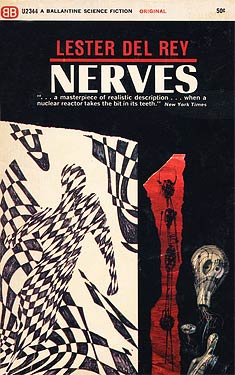Lester del Rey
Completed 1/10/2015, Reviewed 1/11/2015
2 stars
I bought this book from a used paperback vendor at Orycon
2014 for a buck. I thought I’d try another novel by del Rey after my less than satisfying
experience with “Pstalemate” last year. “Nerves” is about an atomic products
manufacturing plant disaster, originally written as a novella in 1942, before
Hiroshima and Nagasaki. It was expanded
into a short novel in ’56, and then republished around the time of the Three Mile
Island accident. I thought it would be a
fun romp of disaster porn, a la the book “The Prometheus Crisis” or the film “The
China Syndrome”. Instead, it makes me
consider the idea that del Rey was a better publisher and promoter of science
fiction than a writer of it.
The most interesting thing about this book is that it is mostly
told from the perspective of the doctor
 stationed at the plant. I rather liked Doc Ferrel, a gruff, former
genius surgeon and his long suffering wife Emma, who didn’t get nearly enough
scenes. I also liked the junior surgeon
Jenkins. Del Rey made them quite real
without making them too soapy, and given the short length of the novel, gave
them nicely distinct personalities. I
was particularly fond of Jenkins’ self-awareness of his own nerves, which is
part of the reference in the title.
stationed at the plant. I rather liked Doc Ferrel, a gruff, former
genius surgeon and his long suffering wife Emma, who didn’t get nearly enough
scenes. I also liked the junior surgeon
Jenkins. Del Rey made them quite real
without making them too soapy, and given the short length of the novel, gave
them nicely distinct personalities. I
was particularly fond of Jenkins’ self-awareness of his own nerves, which is
part of the reference in the title.
The other reference to the title is the speculative result
of being blasted with atomic particulates, that they cause a body’s nerves to
spasm uncontrollably resulting in strain, broken bones, and paralysis. In fact, I found the medical crisis to be
more interesting than the disaster itself.
It was exciting and suspenseful.
The rest of the story was harder to take. Seventy years of better understanding of the
effects of radiation make this book quite dated. The blood transfusion and curare treatment
del Rey purports seems naïve now that we know about the long term problems with
cancers and genetic defects. And the
dumping of the “neutralized” radioactive waste into the nearby river is just
terrifying. It makes the happy ending
simply unbelievable.
The Isotope R/Mahler’s Isotope story line was also quite contrived. I think this is one of the problems with hard
science fiction. When an author gets too
detailed in the speculation of the science, the result becomes dated and
unbelievable as new knowledge increases our understanding of it. This is a major problem in “Nerves”. I found myself thinking “This is plain wrong”
through much of the technical discussions, and I have a pretty high threshold
for willing suspension of disbelief. It’s
easier to read a book about flying cars and teleportation in the 1970s than it
is to read this.
I give this book two stars out of five because the medical
scenes are wonderfully suspenseful. But
for being only 150 pages long, far too many pages contained contrived
speculation that just flat out seemed wrong.
I seriously have to do a lot more research before picking up another del
Rey book.
Thanks for writing this Steven. Your observation correlate with my own with regard to Lester's work.
ReplyDeleteCheers!
Jerry
Thanks for commenting Jerry! It's good to know that I'm not the only one who feels the same way.
DeleteThis sounds so familiar that I'm wondering if I read the short story at one time. I would have sworn, however, that the only Lester del Rey story I had ever read was the excellent "To Avenge Man".
ReplyDeleteI'll have to keep an eye out for that one. I would like to find just one good book by him.
DeleteThis was a short story printed in an issue of Galaxy magazine, and it is in this NESFA Press collection:
Deletehttp://www.nesfa.org/press/Books/delRey-2.html
Maybe the library has it?
I haven't read the book, but I've seen the tv version on an Outer Limits or Twilight Zone rerun.
ReplyDelete